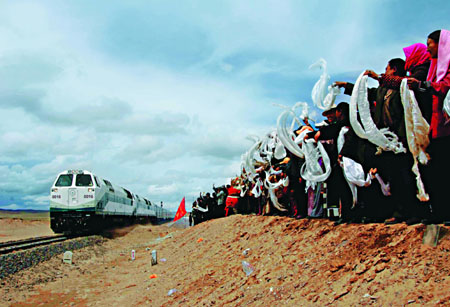| In 2006, taking full advantage of the opening of the Qinghai-Tibet Railway, Tibet vigorously developed the mining, Tibetan medicine, green food, beverage and building material industries, and the overall industrial economy saw faster development. The added value of the overall industry reached 2.165 billion Yuan, up 16.8 percent over 2005, the fastest increase since 1983. Of this, the added value of the enterprises of towns and those above town level reached 2.095 billion Yuan, up 19.8 percent. Their output value was 3.740 billion Yuan, an increase of 20.9 percent from that of 2005. The output value of light industry was 1.361 billion Yuan, up 0.6 percent, and that of heavy industry 2.379 billion Yuan, an increase of 37.1 percent. The output value of the enterprises run by foreigners and the people from Hong Kong, Macao and Taiwan reached 251 million Yuan, up 13.3 percent.
The profits of the industrial enterprises above designated size reached 390 million Yuan, up 6 percent over 2005. The profit of State-owned and State-controlled enterprises was 232 million Yuan, a fall of 18.3 percent; that of collective enterprises reached 27 million Yuan, an increase of 49.7 percent; and that of joint-stock enterprises stood at 122 million Yuan, up 32.6 percent.

The Qinghai-Tibet Railway is expected to help boost the Tibetan economy.
The output of beer hit 63,300 tons, a rise of 29.4 percent; that of Chinese traditional patent medicine (Tibetan medicine) 1,296 tons, up 7.1 percent; that of water supply 84.66 million tons, up 4.5 percent; and that of bottled (canned) drinking water 8,115 tons, up 30.6 percent.
Electric Power
The year 2006 witnessed new headway made by Tibet in the construction and management and marketing of electric power. With regard to the electric power production, the generated energy of the region reached 1.515 billion kWh, up 13.6 percent. A total of 785 million Yuan was invested in construction. Shiquanhe Power Station was put into service; the two units of Zhikung Power Station began to generate electricity; and Xoika Power Station and the transmission and transformer project from Qamdo to the mine of Yulung was under construction. The feasibility study of Tiger Mouth Power Station passed evaluation and was qualified to apply for approval; the feasibility study of the access system of Xoika Power Station passed examination; and the development layout of Yarlung Zangbo River and Jinshajiang River, Nujiang River and Lancangjiang River in southeast Tibet went into operation successively.
The theoretical storage quantity of waterpower in Tibet reaches over 200 million kW, ranking first in China. It is a basic way for solving the problem concerning power supply for the farming and herding areas in the region. In 2006, Tibet continued to carry out the "Bright Project", "Electricity Sent to Villages Project" and the third phase of rural power grid project, adding 2,775 kW installed capacity of hydropower, which solved the power supply needs of 34 towns, 489 villages and 137,900 persons.
In the coming years, Tibet will actively accelerate the construction of the continual energy base of "the diversion of electricity from west to east" and work hard to strengthen the construction and alteration of the third-level power grid, ensuring power security. Efforts are also made by Tibet to build a total installed capacity from the present 500,000 kW to 1.2 million kW, basically ensuring no village is without electricity and promoting further development of the economy and society.
Mining
Thanks to continuous prospecting and development of advantageous mineral resources, mining in Tibet has realized stable development. In 2006, the output of chrome reached 121,800 tons, that of vanadium 415,000 tons, that of copper minerals 1.26 million tons and that of cement 1.6667 million tons. The exploitation volume of common building materials such as sandstone also increased on a large scale, with the annual output reaching five million cubic meters and the output value surpassing one billion Yuan.
In 2006, Tibet invested over 80 million Yuan in prospecting and development. The region has 101 kinds of mines and 2,000-plus ore fields, with a potential economic value surpassing 1,000 billion Yuan. The reserves of 13 kinds of minerals such as chrome, copper and boron mines lead the country. In the next five to ten years, the total annual output value of Tibet's mining should reach over 10 billion Yuan, accounting for one-third of the total output value of the region.
Construction
The added value of the building industry in 2006 reached 5.838 billion Yuan, up 25.2 percent, and the proportion in the GDP increased to 20.13 percent. With the development of the industry, more than 30,000 farmers and herders became involved, gaining income growth of over 100 million Yuan.
Recent years have seen increasing investment in the realty business with further reform of the housing system. In 2006 the number of real estate development enterprises registered in Tibet reached 76, investment in real estate development amounted to 810 million Yuan, and the area of commercial housing added up to 610,000 square meters, up 39 percent from 2005.

Tibetan farmers celebrating the Tibetan New Year in front of their new residences.
|





